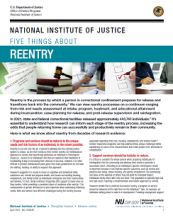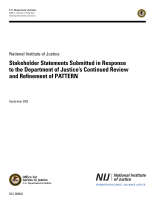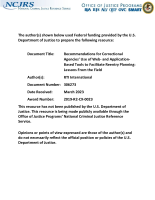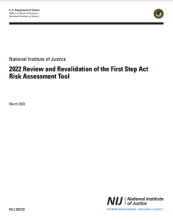Reentry
Best Practices for Improving the Use of Criminal Justice Risk Assessments: Insights From NIJ’s Recidivism Forecasting Challenge Winners Symposium
Winners from NIJ’s Recidivism Forecasting Challenge share their approaches to employing risk assessments and recommendations for practitioners and scientists.
A Mixed Method Evaluation of the Role of Religion in Desistance and Reentry
Investigating the Effect of Post-Release Housing Mobility on Recidivism: Considering Individuals Convicted of Sexual Offenses
The Effects of Age at Prison Release on Women's Desistance Trajectories: a Mixed-Method Analysis
Improving Employment Outcomes for the Federal Bureau of Prisons' Returning Citizens
Enhancing Vocational Training in Corrections: A Type 1 Hybrid Randomized Controlled Trial Protocol for Evaluating Virtual Reality Job Interview Training Among Returning Citizens Preparing for Community Re-entry
Addressing Barriers to Housing in Reentry Programs Working to Address a Variety of Needs: A Qualitative Study of Second Chance Act Grantees
A Nationwide Assessment of Jail Reentry Policies and Practices: A Two-Tiered Study of the Field
De-escalation Training: What Works, Implementation Lessons, and Taking It to Scale; Plenary at the 2023 NIJ Research Conference
Police use of force, while infrequently used, is a tremendous concern to public safety in the United States when officers employ it excessively or inappropriately, causing injury or death and eroding public trust in law enforcement. This plenary from the 2023 NIJ Research Conference describes the Integrating, Communications, Assessment, and Tactics (ICAT) de-escalation training program developed by the Police Executive Research Forum to guide officers in defusing critical incidents.
See the YouTube Terms of Service and Google Privacy Policy
Inclusive Research: Engaging People Closest to the Issue Makes for Better Science & Greater Impact; 2023 NIJ Research Conference Plenary
This panel will discuss what inclusive research is, how to conduct it, and what issues and challenges exist about engaging in it. “Inclusive research” has its history as a participatory research method designed to ensure people closest to the issue or problem under study are authentically engaged in the research process rather than simply being “research subjects.” While community-based participatory research has begun to take on greater prominence in the criminal justice realm, such efforts are largely confined to qualitative research inquiries.
See the YouTube Terms of Service and Google Privacy Policy
The Residue of Imprisonment: Prisoner Reentry and Carceral Gang Spillover
Meeting People Where They Are to Improve Institutional Culture
Incarcerated individuals deserve opportunities for healing and growth, but they often lack the necessary resources for such opportunities. Additionally, organizational cultures that don’t support these outcomes often stand in the way. Researchers and practitioners gathered at NIJ’s 2023 National Research Conference to share ideas and projects that will increase opportunities for incarcerated populations around the country. This show continues their conversation.
Five Things About Reentry
Impact of Traumatic Brain Injury on the Receipt of Services Following Release from Prison
Stakeholder Statements Submitted in Response to the Department of Justice's Continued Review and Refinement of PATTERN
NIJ Director Nancy La Vigne Discusses Evidence-Based Strategies for Successful Reentry
NIJ Director Nancy La Vigne highlights the importance of evidence-based strategies for successful reentry. This strategy emphasizes the need for tailored and holistic support that starts during confinement and continues after release, with a focus on family involvement, cognitive-behavioral therapy, and community supervision.
See the YouTube Terms of Service and Google Privacy Policy
Recommendations for Correctional Agencies’ Use of Web- and Application-Based Tools to Facilitate Reentry Planning: Lessons From the Field
NIJ’s Role Under the First Step Act
The First Step Act of 2018 (the Act) aims to reform the federal prison system and reduce recidivism.
NIJ plays a key role in major components of the Act and will assist the Attorney General in —
- Assessing the Federal Bureau of Prisons’ existing risk and needs assessment system.
- Developing and evaluating a...
2022 Review and Revalidation of the First Step Act Risk Assessment Tool
NIJ 2021 Forecasting Challenge: Filtering Winners by Year, Variables, and Methods
NIJ's 2021 Recidivism Forecasting Challenge aimed to improve the ability to forecast recidivism using person- and place-based variables with the goal of improving outcomes for those serving a community supervision sentence.
As a condition of receiving their prize, each of the 25 winners[1] were asked to submit a research paper that describes which variables did and did not matter to the final forecasting model...







